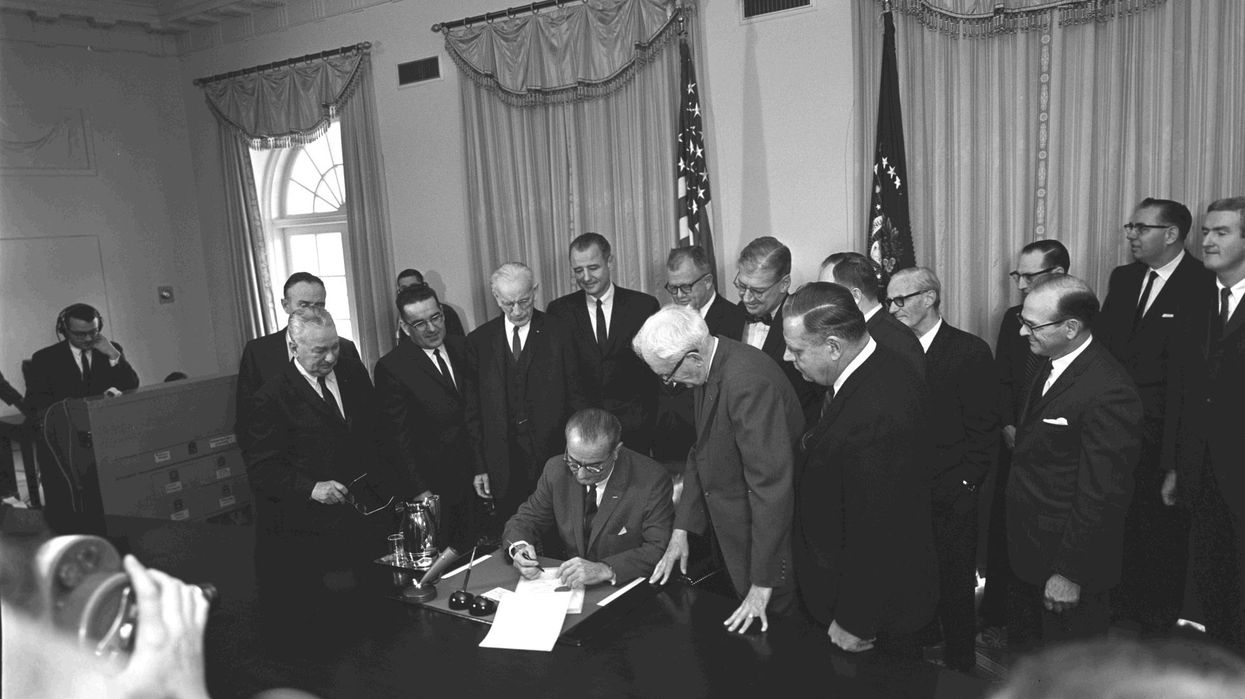Molineaux is co-publisher of The Fulcrum and president/CEO of the Bridge Alliance Education Fund.
Last week I wrote about the underlying assumptions of authoritarian scholarship (i.e. pro-democracy work) and bridging divides work. They are different – but it’s not a competition. They are different tools for different times. Bridging divides work is the tool to 1) increase defections from the authoritarian-leaning supporters and 2) help us self-govern once democracy is protected.
Citizens like us need relationships with our political opponents to remain human to one another. And in the bridging divides work, research supports connecting with an identity that is not political to build and maintain relationships. When we reach out as parents, pet owners, members of a faith community, etc., we will have more empathy and tolerance for our inevitable differences. And once we are connected, if we commit to stay in the relationship despite our politics, our bonds of trust and affection can deepen.
For marginalized communities or those who believe themselves to be victims of cultural changes, remaining in relationships despite differences is harder. Facing the complexities of America’s racist history and the ability of conflict profiteers to stoke our outrage, no one is immune from wanting to walk away from conflict. Walking away and “divorcing” each other will decrease the ability of our country to have any type of civil dialogue, to self-govern in today’s environment.
We need only look at our family and friends to feel the divisions that have deepened in our lives. For some, it’s a tension only felt at holidays. For others, these tensions have shattered our sense of belonging and inclusion. Yet some people find the tensions have clarified what is and is not acceptable and consequently have found a new sense of belonging. Or through judgment of others, some feel isolated and lonely. A lot of us are more lonely, even when we are with people. Where can we be ourselves and feel like we belong?
In short, we are a hot mess as a nation.
While this is not the first time our nation has seen these deep divisions, it is the first time for many of us. The first time in our lifetimes. We are in the midst of the uncomfortable part of the cycle of choosing our democratic republic over autocracy or tyranny. This happens roughly every 50-80 years. What will we choose this time?
Historically, the most divisive – and politically violent times– in the United States have been immediately preceding an expansion of rights to a new group of people. For example:
1776-1789 – A new country and a democratic republic, if we can keep it
The Revolutionary War broke our connection to the British monarchy and allowed for self-rule by the white men who owned property. This was enshrined in the U.S. Constitution and Bill of Rights ( amendments 1-10). It’s worth noting that the Bill of Rights is oriented as “freedom from government interference” rather than “government systems established to support freedom to pursue ambitions, happiness, etc.”
1850-1870 – Abolitionists vs. economic interests, a delayed fight for freedom for all men
Following the Civil War, and the assassination of President Abraham Lincoln, self-rule through voting was expanded to all men, regardless of race or ethnicity. This was enshrined in amendments 13-15. Voting and election rights were initially heralded as equality for formerly enslaved people during Reconstruction. Of note, the federal government formally abandoned Reconstruction following the 1876 election when multiple slates of electors were sent from Southern states, casting doubt on the winner of the presidential election. Ending Reconstruction was the compromise that allowed Rutherford B. Hayes to be sworn in as president in 1877.
1850-1920 – Women squeak through the vote after a century of effort
The suffrage movement had emerged alongside the abolitionist movement the previous century. It took another 60 years following the Civil War before white women had the right to vote. This right was enshrined in the 19th amendment in 1920. And Jim Crow flourished with the use of literacy and poll taxes as tools of voter suppression.
1954-1964 – Forty years of movement building realized
The Civil Rights Act equalized voting for all people over 21 through congressional legislation and allowed for federal enforcement of laws that states would not uphold. Scholars speculate that John F. Kennedy’s assassination galvanized the non-violent activists of the civil rights movement. As the nation mourned, President Lyndon B. Johnson pushed through the legislation as a tribute to Kennedy. The Constitution was again amended for the 24th time, prohibiting the use of poll taxes to limit voting. This formally ended the Jim Crow era. Although new forms of discrimination continue to proliferate.
1965-1971 – Old enough to go to war, old enough to vote
On the heels of the civil rights movement and the summer of love, and as the draft for Vietnam dragged on, young people lobbied and protested for the right to vote. They argued if they were old enough to serve in the military, they should be allowed to vote and have a voice on those choosing to send them to war. Political violence was waged when students were shot at Kent State and two more high-profile assassinations took place – Martin Luther King Jr. and Robert Kennedy in 1968. The 26th amendment was ratified in 1971, allowing all citizens aged 18 or older to vote.
2008-2028? – Culture wars, changing demographics and the balance of power
Americans are stoked by the conflict profiteers and some politicians who blatantly work to divide us. This leaves many Americans questioning the integrity of our elections, the motives of our fellow citizens, and believing conspiracy theories devoid of reality. Others see threats to our democracy and this fear of fascism fuels our work to protect and defend our nation. The media we consume adds to the divide and thus no one is immune to the divisive thinking that is inflicting our society. No. One. Let’s not be too full of ourselves to think we have immunity. I believe democracy is under threat. Is it, really? We’ll only know in retrospect if we are right. Most citizens believe themselves to be protecting our nation.
I share this historical perspective to provide comfort. This moment of increasing political violence is something our nation has seen before. And our ancestors have shown us the path forward using non-violent means and holding people accountable. It’s our turn to do so, now.
Next column: Quality relationships strengthen democracy.




















Eric Trump, the newly appointed ALT5 board director of World Liberty Financial, walks outside of the NASDAQ in Times Square as they mark the $1.5- billion partnership between World Liberty Financial and ALT5 Sigma with the ringing of the NASDAQ opening bell, on Aug. 13, 2025, in New York City.
Why does the Trump family always get a pass?
Deputy Attorney General Todd Blanche joined ABC’s “This Week” on Sunday to defend or explain a lot of controversies for the Trump administration: the Epstein files release, the events in Minneapolis, etc. He was also asked about possible conflicts of interest between President Trump’s family business and his job. Specifically, Blanche was asked about a very sketchy deal Trump’s son Eric signed with the UAE’s national security adviser, Sheikh Tahnoon.
Shortly before Trump was inaugurated in early 2025, Tahnoon invested $500 million in the Trump-owned World Liberty, a then newly launched cryptocurrency outfit. A few months later, UAE was granted permission to purchase sensitive American AI chips. According to the Wall Street Journal, which broke the story, “the deal marks something unprecedented in American politics: a foreign government official taking a major ownership stake in an incoming U.S. president’s company.”
“How do you respond to those who say this is a serious conflict of interest?” ABC host George Stephanopoulos asked.
“I love it when these papers talk about something being unprecedented or never happening before,” Blanche replied, “as if the Biden family and the Biden administration didn’t do exactly the same thing, and they were just in office.”
Blanche went on to boast about how the president is utterly transparent regarding his questionable business practices: “I don’t have a comment on it beyond Trump has been completely transparent when his family travels for business reasons. They don’t do so in secret. We don’t learn about it when we find a laptop a few years later. We learn about it when it’s happening.”
Sadly, Stephanopoulos didn’t offer the obvious response, which may have gone something like this: “OK, but the president and countless leading Republicans insisted that President Biden was the head of what they dubbed ‘the Biden Crime family’ and insisted his business dealings were corrupt, and indeed that his corruption merited impeachment. So how is being ‘transparent’ about similar corruption a defense?”
Now, I should be clear that I do think the Biden family’s business dealings were corrupt, whether or not laws were broken. Others disagree. I also think Trump’s business dealings appear to be worse in many ways than even what Biden was alleged to have done. But none of that is relevant. The standard set by Trump and Republicans is the relevant political standard, and by the deputy attorney general’s own account, the Trump administration is doing “exactly the same thing,” just more openly.
Since when is being more transparent about wrongdoing a defense? Try telling a cop or judge, “Yes, I robbed that bank. I’ve been completely transparent about that. So, what’s the big deal?”
This is just a small example of the broader dysfunction in the way we talk about politics.
Americans have a special hatred for hypocrisy. I think it goes back to the founding era. As Alexis de Tocqueville observed in “Democracy In America,” the old world had a different way of dealing with the moral shortcomings of leaders. Rank had its privileges. Nobles, never mind kings, were entitled to behave in ways that were forbidden to the little people.
In America, titles of nobility were banned in the Constitution and in our democratic culture. In a society built on notions of equality (the obvious exceptions of Black people, women, Native Americans notwithstanding) no one has access to special carve-outs or exemptions as to what is right and wrong. Claiming them, particularly in secret, feels like a betrayal against the whole idea of equality.
The problem in the modern era is that elites — of all ideological stripes — have violated that bargain. The result isn’t that we’ve abandoned any notion of right and wrong. Instead, by elevating hypocrisy to the greatest of sins, we end up weaponizing the principles, using them as a cudgel against the other side but not against our own.
Pick an issue: violent rhetoric by politicians, sexual misconduct, corruption and so on. With every revelation, almost immediately the debate becomes a riot of whataboutism. Team A says that Team B has no right to criticize because they did the same thing. Team B points out that Team A has switched positions. Everyone has a point. And everyone is missing the point.
Sure, hypocrisy is a moral failing, and partisan inconsistency is an intellectual one. But neither changes the objective facts. This is something you’re supposed to learn as a child: It doesn’t matter what everyone else is doing or saying, wrong is wrong. It’s also something lawyers like Mr. Blanche are supposed to know. Telling a judge that the hypocrisy of the prosecutor — or your client’s transparency — means your client did nothing wrong would earn you nothing but a laugh.
Jonah Goldberg is editor-in-chief of The Dispatch and the host of The Remnant podcast. His Twitter handle is @JonahDispatch.